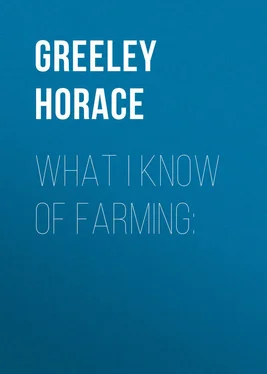Horace Greeley - What I know of farming:
Здесь есть возможность читать онлайн «Horace Greeley - What I know of farming:» — ознакомительный отрывок электронной книги совершенно бесплатно, а после прочтения отрывка купить полную версию. В некоторых случаях можно слушать аудио, скачать через торрент в формате fb2 и присутствует краткое содержание. Жанр: foreign_antique, foreign_prose, foreign_language, на английском языке. Описание произведения, (предисловие) а так же отзывы посетителей доступны на портале библиотеки ЛибКат.
- Название:What I know of farming:
- Автор:
- Жанр:
- Год:неизвестен
- ISBN:нет данных
- Рейтинг книги:4 / 5. Голосов: 1
-
Избранное:Добавить в избранное
- Отзывы:
-
Ваша оценка:
- 80
- 1
- 2
- 3
- 4
- 5
What I know of farming:: краткое содержание, описание и аннотация
Предлагаем к чтению аннотацию, описание, краткое содержание или предисловие (зависит от того, что написал сам автор книги «What I know of farming:»). Если вы не нашли необходимую информацию о книге — напишите в комментариях, мы постараемся отыскать её.
What I know of farming: — читать онлайн ознакомительный отрывок
Ниже представлен текст книги, разбитый по страницам. Система сохранения места последней прочитанной страницы, позволяет с удобством читать онлайн бесплатно книгу «What I know of farming:», без необходимости каждый раз заново искать на чём Вы остановились. Поставьте закладку, и сможете в любой момент перейти на страницу, на которой закончили чтение.
Интервал:
Закладка:
He who has a farm already, and is content with it, has no reason to ask, "Whither shall I go?" and he may rest assured that thoroughly good farming will pay as well in New England as in Kansas or in Minnesota. I advise no man who has a good farm anywhere, and is able to keep it, to sell and migrate. I know men who make money by growing food within twenty miles of this city quite as fast as they could in the West. If you have money to buy and work it, and know how to make the most of it, I believe you may find land really as cheap, all things considered, in Vermont as in Wisconsin or Arkansas.
And yet I believe in migration – believe that there are thousands in the Eastern and the Middle States who would improve their circumstances and prospects by migrating to the cheaper lands and broader opportunities of the West and South. For, in the first place, most men are by migration rendered more energetic and aspiring; thrown among strangers, they feel the necessity of exertion as they never felt it before. Needing almost everything, and obliged to rely wholly on themselves, they work in their new homes as they never did in their old; and the consequences are soon visible all around them.
"A stern chase is a long chase," say the sailors; and he who buys a farm mainly on credit, intending to pay for it out of its proceeds, finds interest, taxes, sickness, bad seasons, hail, frost, drouth, tornadoes, floods, &c., &c., deranging his calculations and impeding his progress, until he is often impelled to give up in despair. There are men who can surmount every obstacle and defy discouragement – these need no advice; but there are thousands who, having little means and large families, can grow into a good farm more easily and far more surely than they can pay for it; and these may wisely seek homes where population is yet sparse and land is consequently cheap. Doubtless, some migrate who might better have forborne; yet the instinct which draws our race toward sunset is nevertheless a true one. The East will not be depopulated; but the West will grow more rapidly in the course of the next twenty years than ever in the past. The Railroads which have brought Kansas and Minnesota within three days, and California within a week of us, have rendered this inevitable.
But the South also invites immigration as she never did till now. Her lands are still very cheap; she is better timbered, in the average, than the West; her climate attracts; her unopened mines and unused water-power call loudly for enterprise, labor and skill. It is absurd to insist that her soil is exhausted when not one-third of it has ever yet been plowed. I do not advise solitary migration to the South, because she needs schools, mills, roads, bridges, churches, &c., &c., which the solitary immigrant can neither provide nor well do without: and I have no assurance that he, if obliged to work out for present bread, would find those ready to employ and willing to pay him; but let a hundred Northern farmers and mechanics worth $1,000 to $3,000 each combine to select (through chosen agents) and buy ten or twenty thousand acres in some Southern State, embracing hill and vale, timber and tillage, water-power and minerals, and divide it equitably among themselves, after laying it out with roads, a park, a village-plat, sites for churches, schools, &c., and I am confident that they can thus make pleasant homes more cheaply and speedily there than almost anywhere else.
Good farming land, improved or unimproved, is this day cheaper in the United States, all things considered, than in any other country – cheaper than it can long remain. So many are intent on short cuts to riches that the soil is generally neglected, and may be bought amazingly cheap in parts of Connecticut as well as in Iowa or Nebraska. When I was last in Illinois, I rode for some hours beside a gray-coated farmer of some sixty years, who told me this: "I came here thirty years ago, and took up, at $1-1/4 per acre, a good tract of land, mainly in timber. I am now selling off the timber at $100 per acre, reserving the land." That seems to me a good operation – not so quick as a corner in the stock-market, but far safer. And, while I would advise no man to incur debt, I say most earnestly to all who have means, "Look out the place where you would prefer to live and die; take time to suit yourself thoroughly; choose it with reference to your means, your calling, your expectations, and, if you can pay for it, buy it. Do not imagine that land is cheap in the West or the South only; it is to be found cheap in every State by those who are able to own and who know how to use it."
I earnestly trust that the obvious advantages of settling in colonies are to be widely and rapidly improved by our people, nearly as follows: One thousand heads of families unite to form a colony, contribute $100 to $500 each to defray the cost of seeking out and securing a suitable location, and send out two or three of the most capable and trustworthy of their number to find and purchase it; and now let their lands be surveyed and divided into village or city lots at or near the center, larger allotments (for mechanics' and merchants' homes) surrounding that center, and far larger (for farms) outside of these; and let each member, on or soon after his arrival, select a village-lot, out-lot, farm, or one of each if he chooses and can pay for them. Let ample reservations of the best sites for churches, school-houses, a town hall, public park, etc., be made in laying out the village, and let each purchaser of a lot or farm be required to plant shade-trees along the highways which skirt or traverse it. If irrigation by common effort be deemed necessary, let provision be made for that. Run up a large, roomy structure for a family hotel or boarding-house; and now invite each stockholder to come on, select his land, pay for it, and get up some sort of a dwelling, leaving his family to follow when this shall have been rendered habitable; but, if they insist on coming on with him and taking their chances, so be it.
IV.
PREPARING TO FARM
I write mainly for beginners – for young persons, and some not so young, who are looking to farming as the vocation to which their future years are to be given, by which their living is to be gained. In this chapter, I would counsel young men, who, not having been reared in personal contact with the daily and yearly round of a farmer's cares and duties, purpose henceforth to live by farming.
To these I would earnestly say, "No haste!" Our boys are in too great a hurry to be men. They want to be bosses before they have qualified themselves to be efficient journeymen. I have personally known several instances of young men, fresh from school or from some city vocation, buying or hiring a farm and undertaking to work it; and I cannot now recall a single instance in which the attempt has succeeded; while speedy failure has been the usual result. The assumption that farming is a rude, simple matter, requiring little intellect and less experience, has buried many a well-meaning youth under debts which the best efforts of many subsequent years will barely enable him to pay off. In my opinion, half our farmers now living would say, if questioned, that they might better have waited longer before buying or hiring a farm.
When I was ten years old, my father took a job of clearing off the mainly fallen and partially rotten timber – largely White Pine and Black Ash – from fifty acres of level and then swampy land; and he and his two boys gave most of the two ensuing years (1821-2) to the rugged task. When it was finished, I – a boy of twelve years – could have taken just such a tract of half-burned primitive forest as that was when we took hold of it, and cleared it by an expenditure of seventy to eighty per cent. of the labor we actually bestowed upon that. I had learned, in clearing this, how to economize labor in any future undertaking of the kind; and so every one learns by experience who steadily observes and reflects. He must have been a very good farmer at the start, or a very poor one afterward, who cannot grow a thousand bushels of grain much cheaper at thirty years of age than he could at twenty.
Читать дальшеИнтервал:
Закладка:
Похожие книги на «What I know of farming:»
Представляем Вашему вниманию похожие книги на «What I know of farming:» списком для выбора. Мы отобрали схожую по названию и смыслу литературу в надежде предоставить читателям больше вариантов отыскать новые, интересные, ещё непрочитанные произведения.
Обсуждение, отзывы о книге «What I know of farming:» и просто собственные мнения читателей. Оставьте ваши комментарии, напишите, что Вы думаете о произведении, его смысле или главных героях. Укажите что конкретно понравилось, а что нет, и почему Вы так считаете.












